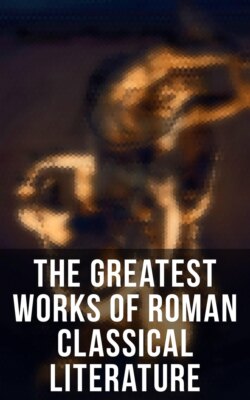Читать книгу The Greatest Works of Roman Classical Literature - Луций Анней Сенека - Страница 18
На сайте Литреса книга снята с продажи.
THE SUBJECT.
ОглавлениеTable of Contents
Micio and Demea are two brothers of dissimilar tempers. Demea is married, and lives a country life, while his brother remains single, and resides in Athens. Demea has two sons, the elder of whom, Æschinus, has been adopted by Micio. Being allowed by his indulgent uncle to gratify his inclinations without restraint, Æschinus has debauched Pamphila, the daughter of a widow named Sostrata. Having, however, promised to marry the young woman, he has been pardoned for the offense, and it has been kept strictly secret. Ctesipho, who lives in the country with his father under great restraint, on visiting the city, falls in love with a certain Music-girl, who belongs to the Procurer Sannio. To screen his brother, Æschinus takes the responsibility of the affair on himself, and succeeds in carrying off the girl for him. Demea, upon hearing of this, censures Micio for his ill-timed indulgence, the bad effects of which are thus exemplified in Æschinus; and at the same time lauds the steady conduct and frugality of Ctesipho, who has been brought up under his own supervision. Shortly after this, Sostrata hears the story about the Music-girl, at the very time that her daughter Pamphila is in labor. She naturally supposes that Æschinus has deserted her daughter for another, and hastens to acquaint Hegio, her kinsman, with the fact. Meantime Demea learns that Ctesipho has taken part in carrying off the Music-girl, whereon Syrus invents a story, and screens Ctesipho for the moment. Demea is next informed by Hegio of the conduct of Æschinus toward Pamphila. Wishing to find his brother, he is purposely sent on a fruitless errand by Syrus, on which he wanders all over the city to no purpose. Micio having now been informed by Hegio, and knowing that the intentions of Æschinus toward Pamphila are not changed, accompanies him to the house of Sostrata, whom he consoles by his promise that Æschinus shall marry her daughter. Demea then returns from his search, and, rushing into Micio’s house, finds his son Ctesipho there carousing; on which he exclaims vehemently against Micio, who uses his best endeavors to soothe him, and finally with success. He now determines to become kind and considerate for the future. At his request, Pamphila is brought to Micio’s house; and the nuptials are celebrated. Micio, at the earnest request of Demea and Æschinus, marries Sostrata; Hegio has a competency allowed him; and Syrus and his wife Phrygia are made free. The Play concludes with a serious warning from Demea, who advises his relatives not to squander their means in riotous living; but, on the contrary, to bear admonition and to submit to restraint in a spirit of moderation and thankfulness.
